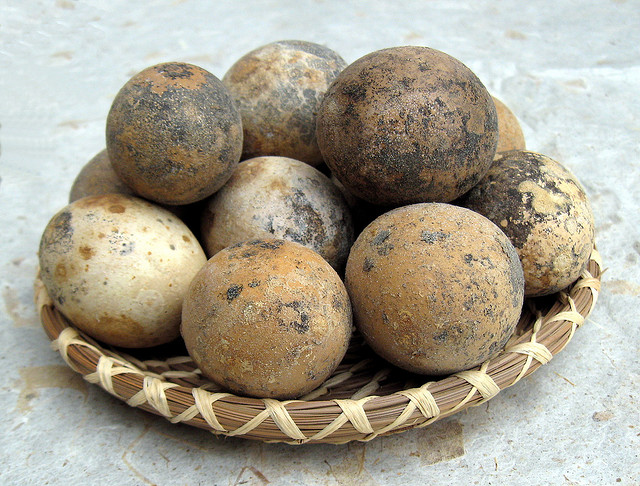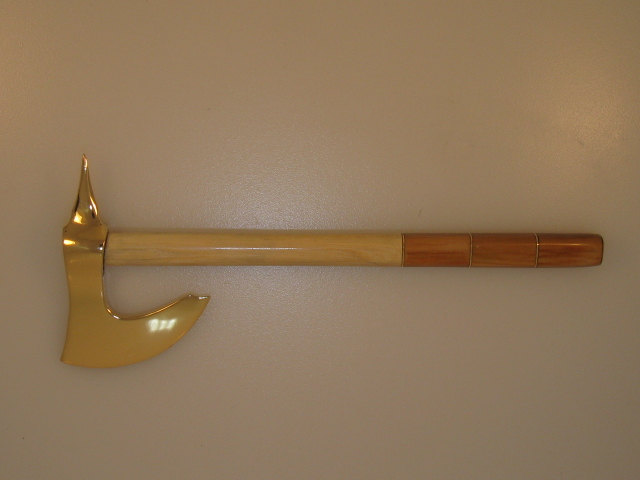
Alcée Fortier.
XIX. “Djabe’s Marriage.”
One day there was a pretty young girl, but she was very proud, and every time the young men came to court her, she found a pretext to send them away. One was too small, another was too tall, another had red hair; in short, she refused all her suitors. One day her mother said to her: “My daughter, you see that tall, tall tree in the middle of the river? I am going to put this pumpkin on the smallest branch at the top of the tree, and that young man who will be able to climb up and catch the pumpkin will be your husband.”
The daughter said she had no objection, so they put a notice in the newspapers. The next week a crowd of young men presented themselves, and among them one who was beautifully dressed and exceedingly handsome. He was Djabe, but nobody knew him. The young girl told her mother: “I wish he would catch the pumpkin.”

All the young men climbed on the tree, but no one could succeed in reaching the pumpkin. When the turn of Djabe came, in one minute he was up the tree, and had the pumpkin in his hand. As soon as he was down he said to the young girl: “Come now, come with me to my house.”
The girl put on her best dress and went away with Djabe. On the road they met a man, who said to Djabe: “Give me my cravat and my collar which I had lent to you.”
Djabe took off his cravat and his collar, and said: “Here, take your old cravat and your old collar.” A little further on, another man saw Djabe and told him: “Give me my shirt which I had lent you.” Djabe took off his shirt and said: “Here, here, take your old shirt.” A little further, he saw another man, who said to him: “Give me my cloak which I had lent to you.” Djabe took off his cloak, and said: “Here, here, take your old cloak.” A little further, another man asked for his trousers, then another one for his hat. Djabe took off the trousers and the hat, and said: “Here, here, take your old trousers and your old hat.” He came down from his carriage and disappeared for a few minutes, then he returned as well dressed as before.
The young lady was beginning to be very much frightened when they met another man, who said: “Give me my hoxses which I had lent to you.” Djabe gave him his four horses, and said to his wife: “Get down from the carriage and hitch yourself to it.” She drew the carriage as far as Djabe’s house, and was so frightened that her heart was almost in her mouth.
Djabe entered his garden, and said to his wife: “Remain here with my mother.” As soon as he was gone the mother said to the young lady: “Ah! my daughter, you have taken a bad husband; you have married Djabe.”
The poor girl was so sorry that she did not know what to do, and she said to the old woman: “Can you not tell me how I can run away?” The old woman replied: “Yes, wait until to-morrow morning; but come, let me show you something.” She opened the door of a little room, and said: “Look, my daughter.” The girl looked in the room, and what did she see? A number of women hanging from a nail. She was so frightened that she asked the old woman if she could not hide her somewhere until the next morning.
The woman said: “Yes, but let me tell you how you can escape from here. When Djabe tells you to give one sack of corn to his rooster which wakes him up in the morning, you will give him three sacks that he may eat more and not crow so early. Then you will go to the chicken house and take six dirty eggs. Take care not to take clean eggs; that will bring you bad luck.”

The next morning the young lady gave the rooster three sacks of corn, she took her eggs, and ran away. When the rooster had finished eating his three sacks, he crowed: “Mr. Djabe, awake quickly; some one has run away from the house!” Djabe got up quickly and started running after his wife. The poor girl looked behind her, and saw smoke and fire — indeed, Djabe himself. She took an egg and broke it: a high wooden fence arose in the middle of the road. Djabe had to return home to get his golden axe to cut down the fence. After he had broken down the fence he took his axe to his house.

The girl looked behind her; she saw smoke and fire — Djabe himself. She broke another egg: there grew up an iron fence. Djabe went home to get his golden axe, and had to take it back after breaking the fence.
The girl looked again; there was fire and smoke. She broke another egg: a great fire rose up in the road. Djabe went to get his jar of water to put out the fire, and then had to take the jar back.
The girl heard again a noise; it was fire and smoke. She broke another egg: a brick wall grew up. Djabe went to get his golden axe, and carried it back after breaking the wall.
The girl looked again: she saw fire and smoke. She broke another egg: a small river appeared, in which was a small canoe. She entered the canoe and crossed the river. Djabe was obliged to swim across.
The girl looked again; she saw fire and smoke. She broke another egg: a large river appeared. There was a big crocodile on the other side of the river warming himself in the sun. The girl sang: “Grandmother, I pray you, cross me over; grandmother, I pray you, save my life.” The crocodile said: “Climb on my back, my little one, I shall save your life.”
Djabe saw in what way the girl had crossed the river, so he said to the crocodile: “Cross me over, crocodile; cross me over.” The crocodile replied: “Climb on my back; I shall cross you over.” When he reached the middle of the river, he dived under the water, and Djabe was drowned.
When the girl had left her mothers house with her husband, her mother had said to her: “Well, my child, what do you wish me to do with your old white horse?” The girl said to her mother: “I don’t care what you do; put him out in the pasture and let him die if he wants to.” However, when she crossed the river on the crocodile’s back, she saw her old horse in the pasture, and she said to him: “I pray you, old body, save my life!” The horse replied: “Ah, you want me now to save your life; did you not tell your mother to let me die, if I wanted? Well, climb on my back, I shall carry you to your mother.”

The girl soon reached her mother’s house. She got down from the horse and kissed him, then she kissed her mother. She remained at home after that, and did not wish to marry again, after having had Djabe for her husband.
Notes
- Djabe. We have changed the text back to the Creole “Djabe.” Fortier translated the word as “devil”; the word “djab” is indeed derived from the French word “diable” (devil), but the idea behind the djab is unrelated to the devil in the Christian sense of the word. Instead, it is an earthbound voodoo spirit, a spirit that can be associated with an individual. They are thus like the Djinns (genies) of Islam. The djab can perform various tasks, including draining the life out of the victim. During the Hatian Revolution, they were publically credited with protecting the revolutionaries. They are still in important component of Haitian Vodou among the bokors that conjure them. This djab shows up looking like Papa Ghede or Baron Samedi. (Special thanks to Denise Alvarado for helping with the note.)
- Cravat. An early kind of neck-tie.
Page Prepared by:
- Nathan Mabini
- Bruce R. Magee
- Brittany Pierre
- Jasalyn Russell
- KoKo Whitaker
Source
Fortier, Alcée, trans. “The Devil’s Marriage.” Louisiana Folk-Tales in French Dialect and English Translation. Ed. Alcee Fortier. Boston: American Folk-Lore Society, 1895. 69-75. Internet Archive. Web. 13 July 2012. <http:// archive.org/ details/ ajs8769. 0001.001. umich.edu>.
